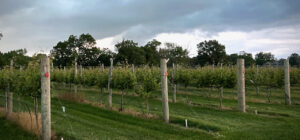
Photo by John Griswold
Todd was near the end of his set by the time I got to the winery. I raised my hand in greeting as I entered, and he said, “Hello, Sir,” into the microphone. I was not sure he recognized me. We went to high school together. He was a class officer, polished and personable, and a high achiever.
I had not seen him for decades, but a recent remembrance weekend for another classmate’s mother gave us the chance to catch up. I learned he had left a teaching career at a state university to be a professional musician, and while he was gratified to be the singer-songwriter he had wanted (secretly) to be since high school, he was stringing together gigs at bars and other small venues. The pay was not great, and he probably put more time into the business side of things than his music. This day he had driven an hour and a half to the three-hour gig.
The winery was a fortified pole barn with painted details to suggest a ruined Italian village. The acoustics were bad. A Cards game was on the TV. Women stood at tables around the edges selling balms, honeybee products, and candles. There were only two other customers in the place, but outside a few people sat on the patio in the sun or under a gazebo next to a concrete silo covered in ivy. The temperature was good and the Midwestern humidity only beginning to rise for the summer. A fountain splashed in a new pond; a nineteenth-century graveyard rested under shade trees on the western edge of the property. Primrose and prairie grasses grew in mulched beds.
I had to go to the bar to order and asked for a pear cider, because I knew better now. The winery industry is relatively new in Southern Illinois, and the wines are very sweet, a bit more cough syrup than dessert wine. Todd had said at the weekend gathering that he asked locals if they got a bad head the next day from all the sugar. They told him they did but liked the wines. This winery was offering a drink special of strawberry sangria made with theirs to help cover the issue.
Todd was well into that song from our youth with the phrase about heaven’s appetite. The distortion from the space did not let me hear enough of the song to recall its title. Then there was time for only one more, and I applied myself to the cider so I would not have to sit there long after the set was over. A kid behind the bar called for Billy Joel’s “Piano Man,” which seemed pointed, but the space prevented Todd from hearing him. The kid ran all the way across the room to say it again. Todd did not know that one and offered “Go Your Own Way,” Fleetwood Mac, instead.
After his set, I went up and said hi and offered to help him carry his stuff out. He thanked me for coming out and said he would break things down himself and tell me when he was ready for me to help. It took him twenty minutes, and one of the last things he did was to put his guitar in its case and wipe it down thoroughly with a cloth. He pulled his car to the door, and I helped load his speakers, mics, stands, bar stool, instrument cases, and a milk crate with binders of cheat sheets. His daughter called, and we stopped so he could talk to her. We paused each time people were surprised at seeing a departing musician come through the front door of the winery.
Then I hit the road. He would too, after saying hello to some college classmates.
As a child of the ’60s, I am finding phrases of that era useful again. One of them—“Everybody’s off on their own trip”—did not necessarily mean drugs even then; it meant we walk our own paths. Sometimes these are mysterious to ourselves and others, even when they intersect. It is hard to find balance in purpose, abilities, meaning, and employment. The mind spends its life running down paths to see what else there might be for it. It takes a serious person to give up this neurosis, which feels like missing out. This day it was very moving to see an old classmate who has gone his own way, directedly, as I have gone mine.
